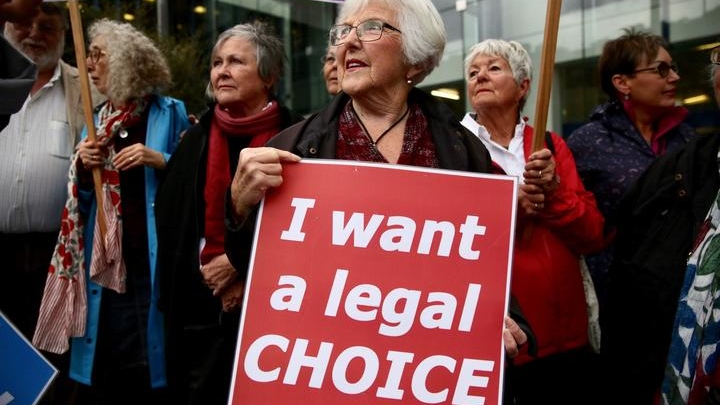
The fight for euthanasia in New Zealand
The post The fight for euthanasia in New Zealand appeared first on The Economic Transcript.

Euthanasia originates from the Greek term ‘eu thanaos’ meaning to die without pain. It refers to the deliberate action taken to end a life that is fuelled by the desire to mitigate the incessant suffering of those involved. Euthanasia is a controversial topic and is a subject of debate across nations. Many countries have legalized euthanasia in the last few years, New Zealand being the recent one to join the bandwagon. Although the decision is fresh, its activism began in 1978 with the formation of the Auckland Voluntary Euthanasia Society by the members of the New Zealand Association of Rationalists and Humanists.
Early political activism with regards to euthanasia in New Zealand was concerned with several bills introduced in the parliament. One such bill was the Death with Dignity Bill, 1995. This Bill was inspired by the decision of the Northern Territory Parliament who had voted in support of voluntary euthanasia. However, this Bill was overruled by the Federal Government in the latter phase. This bill led to an increased debate in the public with some politicians actively advocating their support for Euthanasia.
Michael Laws were one such politician who strongly supported the emulation of the Northern Territory Bill in New Zealand; he found support in fellow Member of Parliament Cam Campion then suffering from terminal cancer. However, the Member of Parliaments were not convinced by the Bill, which led to its ultimate rejection.
Although the Bill was rejected, it paved the way for public discussions on the issue. The second Death with Dignity Bill was introduced shortly after the first Bill was rejected. Death with Dignity Bill, 2003 much like the earlier Bill proposed that persons who were terminally ill could request for a medical professional to end their lives in a manner considered humane and dignified. This decision to end one’s life would be followed after a thorough medical examination, psychiatric assessment, counseling, and personal reflection. This Bill suffered the same fate as the previous one with more than half people voting against it.
The End of Life Choice Bill was introduced by Labour MP Maryan Street in July 2012 however; the Bill was withdrawn in September 2013 and not re-entered following the 2014 election. David Seymour introduced the End of Life Choice Bill again in 2017, this Bill aimed to legalize voluntary euthanasia in particular situations. The Bill sought to give people with terminal illnesses the option of choosing assisted dying which involves the administration of a fatal dose of medicine to a person by a medical practitioner to alleviate their suffering by facilitating death. Quite a few ways of providing the medicines were prescribed in the Bill, which include: ingestion- triggered by the person, intravenous delivery- triggered by the person, ingestion through a tube, and injections.
In 2020, New Zealand had voted to legalize euthanasia with 65.2 % of voters supporting the End of Life Choice Act. The Law allows terminally ill people with less than 6 months to live the choice to get assisted dying if approved by two doctors.
Although the law was supported by both Prime Minister Jacinda Ardern and opposition leader Judith Collins, the result was attributed to the years-long campaign with strong opinions of both supporters and opposing parties. According to the new law, a person must meet set criteria to be eligible for assisted dying.
These include-
a. If a person suffers from a terminal illness that is likely to end the person’s life within six months.
b. Displaying remarkable decline in physical capability
c. Ability to make an informed decision on assisted dying.
The Act came into force a year after two-thirds of New Zealanders voted in favor of it. With this law in place, New Zealand has managed to join the few countries that have chosen to be more humane and compassionate towards its people.
Despite the huge support that euthanasia has managed to garner in the last couple of years, its opponents continue to dissuade the implementation and practice of euthanasia. A group called Euthanasia-Free NZ had campaigned to vote no and they based their decision on the view that euthanasia poses a threat to the well-being of society. Its major concern involves the contraction and undermining of suicide prevention as a result of the legalization of euthanasia. Others argue that this act would force some people to feel obliged to use euthanasia and avoid burdening their families with additional responsibilities.
Currently, Euthanasia is legal in a small number of countries including Belgium, Canada, Colombia, Netherlands, and Luxembourg. Assisted suicide on the other hand is permitted in Switzerland. Other than these countries, several states in the United States along with the Australian state of Victoria have legalized assisted dying.
Written by- Sakshi Shah
Edited by- Sameera S Vasista
The post The fight for euthanasia in New Zealand appeared first on The Economic Transcript.
Amazon said Wednesday it was slashing another 16,000 jobs across the company in an ongoing bid to restructure the sprawling trillion-dollar firm. ‘The reductions we are making today will impact approximately 16,000 roles across Amazon, and we’re again working hard
President Donald Trump on Thursday filed a $5 billion lawsuit against JPMorgan Chase and its CEO Jamie Dimon, claiming that the bank improperly closed his accounts for political reasons. ‘While we regret President Trump has sued us, we believe the suit
ROME — Italian fashion designer Valentino Garavani has died, his foundation said Monday. Usually known only by his first name, Valentino was 93, and had retired in 2008. Founder of the eponymous brand, Valentino scaled the heights of haute couture, created a
